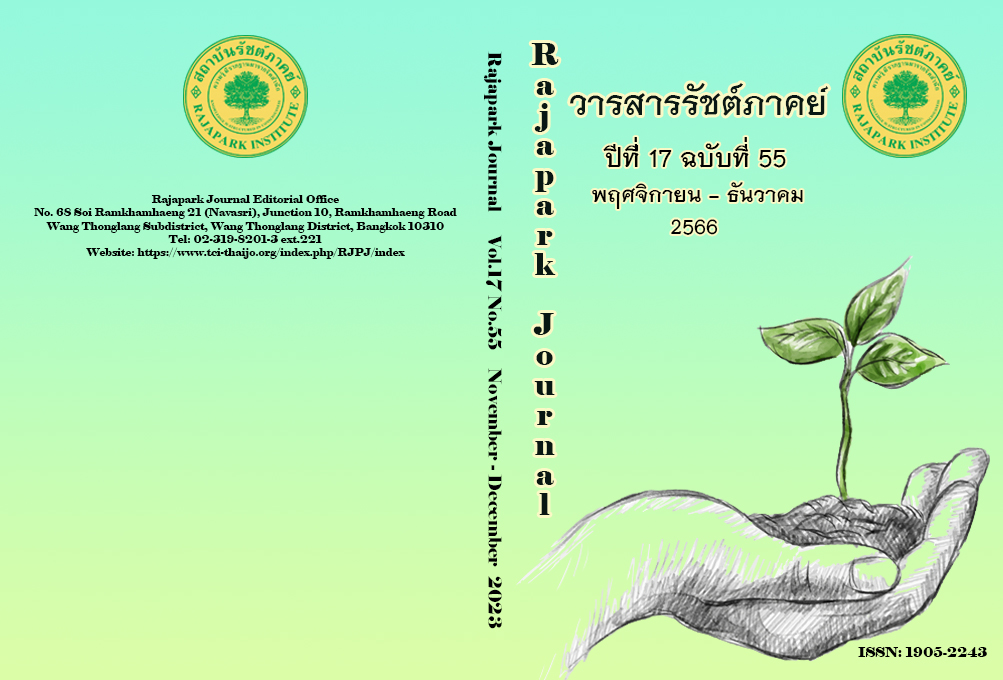Legal Measure of Online Consumer Protection in Digital Age: Study of Regional Trade agreements and European Union Laws
Main Article Content
Abstract
The research aims to study the nature of problems, laws, and regulations of Thailand and the European Union in relation to online consumer protection connected to related Regional Trade Agreements (RTAs) and related global guidelines, to analyze problems and obstacles, such as laws and regulations and legal measures necessitating online consumer protection pursuant to consumers’ rights, and to suggest ways of appropriate action in line with the provisions of RTAs and the development of Thai laws relating to online consumer protection. Qualitative research, document research, and in-depth interviews were utilized to conduct this research. This study found that online consumers, both before and during the spread of pandemic COVID-19 to date, have simultaneously confronted the following categorized problems: problems from self-online consumers, problems from online trade entrepreneurs, dispute settlement problems, remedial problems, limits of cross-border law enforcement, and protection of online consumers’ rights. Meanwhile, none of the definite and comprehensive Thai laws and international laws at the global level on electronic commerce relating to online consumer protection are currently provided so as to tackle the aforesaid categorized problems. But several parts of guidelines on consumer protection in electronic commerce developed by the UN and OECD, several laws of the EU on electronic commerce that provide definite and significantly comprehensive provisions of online consumer protection, and the related provisions of the RTAs would be relevantly beneficial to the enhancement of online consumers’ confidence by the addition of the specific statute on online consumer protection, the recognition of additional 7 necessary rights of online consumers, in particular for vulnerable groups, and effective instruments for law enforcement. Moreover, existing Thai laws have not obstructed Thailand’s implementation of online consumer protection provisions contained in binding RTAs.
Article Details

This work is licensed under a Creative Commons Attribution-NonCommercial-NoDerivatives 4.0 International License.
Views and opinions appearing in the Journal it is the responsibility of the author of the article, and does not constitute the view and responsibility of the editorial team.
References
Department of Business Development. (2020, September 11). Steps of commercial registration for e-commerce business. https://www.thailandplus.tv/archives/350796.
Durovic, M., & Micklitz, H. W. (2017). Internationalization of consumer law: A game changer. Springer.
Electronic Transactions Development Agency (ETDA). (2021, November 24). DES cooperates with ETDA to improve the 1212 OCC center. https://www.etda.or.th/th/pr-news/1212-OCC-Transformation.aspx?feed=590fb9ad-c550-4bc5-9a56-459ad4891d74.
Electronic Transactions Development Agency (ETDA). (2022, December 23). DES cooperates with ETDA to organize hugely! Prepare addressing to 10 provinces nationwide for stimulating Thais’ immunities to be aware of online problems. https://www.etda.or.th/th/pr-news/1212Workshop.aspx?feed=590fb9ad-c550-4bc5-9a56-459ad4891d74
Electronic Transactions Development Agency (ETDA), Baker McKenzie and Faculty of Law, Thammasat University. (2022). Thailand Consumer Digital Rights Status Report. Electronic Transactions Development Agency.
Electronic Transactions Development Agency (ETDA) and Bolliger & Company (Thailand) Limited. (2021). Problematic issues and impacts relating to cross-border electronic commerce. Research Report. Electronic Transactions Development Agency.
European Commission. (2020, November). New consumer agenda 2020-2025 actions to protect European consumers. https://ec.europa.eu/info/sites/default/files/consumer_agenda_-_factsheet_-_en.pdf.
Kim, M. (2022). “Digital Trade Agreements and Services Trade: The case of the Republic of Korea”, in Jong Woo Kang et.al., Unlocking the Potential of Digital Services Trade in Asia and the Pacific, ADB, (November 2022).
ITU and the World Bank. (2020). Digital Regulation Handbook. ITU.
International Trade Centre (ITC). (2016). Bringing SMEs onto the E-commerce Highway. ITC.
Ministry of Trade and Industry of Singapore. (2023). What are Digital Economy Agreements (DEAs)?. https://www.mti.gov.sg/Trade/Digital-Economy-Agreements
OECD. (2021, April 14). Digital Trade Inventory, TAD/TC/WP (2020)14/FINAL.
Office of Consumer Protection Commission, Information Technology Section. (2021, September). Transformation of Work Process to Digital System. https://www.ocpb.go.th/ewt_dl_link.php?nid=12469.
Pitschas, C., & Gerstetter, C. (2017). Consumer Rights in International Trade Agreements, commissioned by Verbraucherzentrale Bundesverband e.V. (vzbv).
Ramsay, I. Regulation of consumer credit. In Howells, G., Ramsay, I., & Wilhelmsson, T. (Eds.). (2018). Handbook of research on international consumer law. Edgar Elgar.
Thailand Plus. (2022, March 21). OCPC organized online seminar on OCPB Complaint: Beyond limit, unlocking every dimension by smart complaint system of OCPC by Virtual Press Conference. https://www.thailandplus.tv/archives/501937.
UNCTAD. (2020). COVID-19 and e-commerce: Impact on businesses and policy responses. United Nations.
United Nations Conference on Trade and Development. (2016). United Nations guidelines for consumer protection. (UNCTAD/DITC/CPLP/MISC/2016/1). United Nations Conference on Trade and evelopment.
World Economic Forum. (2019). Global Governance of Online Consumer Protection and E-commerce. World Economic Forum.
World Trade Organization. (2021). E-commerce talks: two foundational articles cleaned; development issues discussed. https://www.wto.org/english/news_e/news21_e/jsec_12sep21_e.htm.
World Trade Organization. (n.d.). Regional trade agreements and the WTO. https://www.wto.org/english/tratop_e/region_e/scope_rta_e.htm


